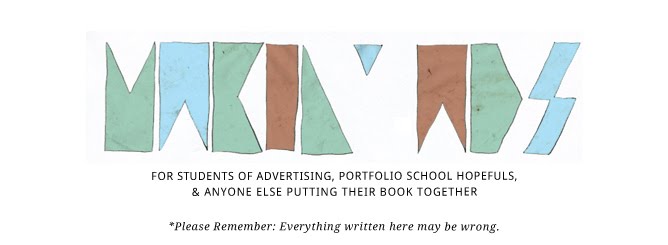
Dave Kingman was a major league baseball player in the '70s and '80s. Pitchers feared him, because when he stepped to the plate, there was a decent chance that Kingman was going to go yard. He was one of those players that got fans on their feet when he stepped into the batter's box. Kingman also has the distinguished honor of being the player with the most homeruns (442) and lowest batting average (.236).
If you are a student, you should strive to be a Dave Kingman.
Last quarter, I taught an advertising competitions class. On the first day, I told my students that they need to swing like they're putting it in the parking lot or they're wasting their time. We were submitting work to competitions. Big ones. The One Show, D&AD, etc. Singles do not win those competitions. Doubles off the left-field wall do not win those competitions.
"Take big swings," while it may be trite, is one of the best pieces of advice I can give students. Even once you get to an agency, your career will be most helped by big swings. Imagine you completely whiff on every assignment (and with big swings come big, ridiculous-looking whiffs) every year, except for one. And with that one non-whiff assignment each year, you win a Cannes Lion. After five years, you'd be the most sought-after young creative in the industry.
Now, you will work for an agency, and they'll probably prefer a slightly better batting average than that. But when you're a student, guess what...no agency. And the simple math looks like this:
Say you do 4 campaigns per class for 5 classes (so 20 campaigns total). Let's take two students and give each campaign they do a score (0-10).
STUDENT 1: 8 8 8 8 8 8 8 8 8 8 8 8 8 8 8 8 8 8 8 8 = AVG of 8.0
STUDENT 2: 2 2 2 10 2 2 10 9 2 3 4 10 2 10 9 3 4 10 5 10 = AVG of 5.5
By conventional wisdom, Student 1 is far superior. An 8 out of 10, that's pretty solid. And so consistent. And look at Student 2--she has a failing grade. But, like I also tell my students, nobody in this business gives a shit what your GPA was. Screw conventional wisdom.
So let's look at it as it will play out in the eyes of those who matter--the creative directors who look at your book.
For your book, you're going to keep your best pieces and ditch the rest. STUDENT 1 has an 8 book. Again, not bad. But student 2, the flunky, her book looks like this: 10 10 9 10 10 9 10 10. See my point? I hire her.
So be a Dave Kingman. Put it in the parking lot. And when you miss and spin yourself around and fall down in the batter's box, get back up and swing even harder at the next one. To mix my sports metaphors, nobody talks about the jabs. They talk about the knockout punches.







 He and his co-writer/then wife, Connie Booth were writing scripts that were 135 pages long. When their producer told them the average 30-minute script was only 60 pages, they continued to write more than double the amount.
He and his co-writer/then wife, Connie Booth were writing scripts that were 135 pages long. When their producer told them the average 30-minute script was only 60 pages, they continued to write more than double the amount.
